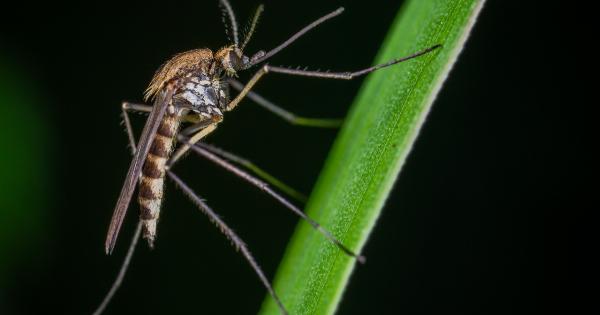West Nile Virus (WNV) is a mosquito-borne disease that first appeared in the United States in 1999. It is a viral infection that primarily affects birds but can also be transmitted to humans through mosquito bites.
Since its initial detection, WNV has spread rapidly across the United States and other parts of the world, causing a significant public health concern.
Transmission of West Nile Virus
The primary mode of transmission of WNV is through mosquito bites. Mosquitoes become infected with the virus after feeding on infected birds. Once infected, they can then transmit the virus to humans and other animals.
It is important to note that WNV cannot be transmitted through direct human-to-human contact.
Symptoms of West Nile Virus Infection
Most people infected with WNV do not develop any symptoms. However, around 20% of infected individuals may experience mild symptoms, including fever, headache, body aches, fatigue, and occasionally a skin rash on the trunk of the body.
These symptoms usually appear within 2 to 14 days after being bitten by an infected mosquito. In rare cases, severe symptoms such as high fever, neck stiffness, disorientation, coma, tremors, convulsions, muscle weakness, and paralysis can occur.
These severe symptoms may lead to long-term neurological complications or even death, especially among those with weakened immune systems or older adults.
Prevention of West Nile Virus
Preventing mosquito bites is the most effective way to reduce the risk of WNV infection. Here are some preventive measures:.
1. Use mosquito repellents:
Apply an EPA-approved mosquito repellent containing DEET or picaridin to exposed skin and clothing when outdoors.
2. Wear protective clothing:
Wear long sleeves, pants, and socks when spending time in mosquito-prone areas, especially during dawn and dusk, when mosquitoes are most active.
3. Eliminate mosquito breeding sites:
Remove standing water from around your house, as mosquitoes breed in stagnant water. Empty and clean water containers, birdbaths, and pet water bowls frequently.
4. Install or repair window and door screens:
Keep mosquitoes outside by ensuring your windows and doors are fitted with screens that do not have any holes or tears.
5. Avoid outdoor activities during peak mosquito activity:
Limit your time outdoors during dawn and dusk when mosquitoes are most active.
Treatment and Care for West Nile Virus
There is currently no specific antiviral treatment available for WNV infection. Most individuals with mild symptoms recover on their own with rest, fluids, and over-the-counter pain relievers, if needed.
In severe cases, hospitalized patients may receive supportive care, such as intravenous fluids, pain medication, and nursing care. Early diagnosis and medical supervision are crucial for people with severe symptoms.
It is advised to consult a healthcare professional if you develop symptoms suggestive of WNV infection, especially if you live in or have recently traveled to an area where WNV is known to occur.
Global Impact and Current Research
Since its emergence in the United States, WNV has spread to other parts of North America, as well as many countries across Europe, Africa, Asia, and Australia. The global impact of WNV has highlighted the need for continued research and surveillance.
Scientific studies focus on various aspects of WNV, including transmission dynamics, mosquito control measures, early detection methods, and vaccine development.
Understanding the ecology and behavior of mosquitoes, as well as the mechanisms of viral transmission, are essential for developing effective control strategies and preventive measures.
Conclusion
West Nile Virus is a potentially serious mosquito-borne disease that can cause mild to severe symptoms or even fatalities.
While the majority of infected individuals may not experience any symptoms, it is crucial to take preventive measures to reduce the risk of infection. Avoiding mosquito bites, eliminating breeding sites, and using protective measures when in mosquito-prone areas can significantly reduce the transmission of WNV.
Early diagnosis and medical supervision are essential for individuals experiencing severe symptoms. Ongoing research aims to enhance our understanding of WNV and develop effective strategies to combat this public health concern.


























